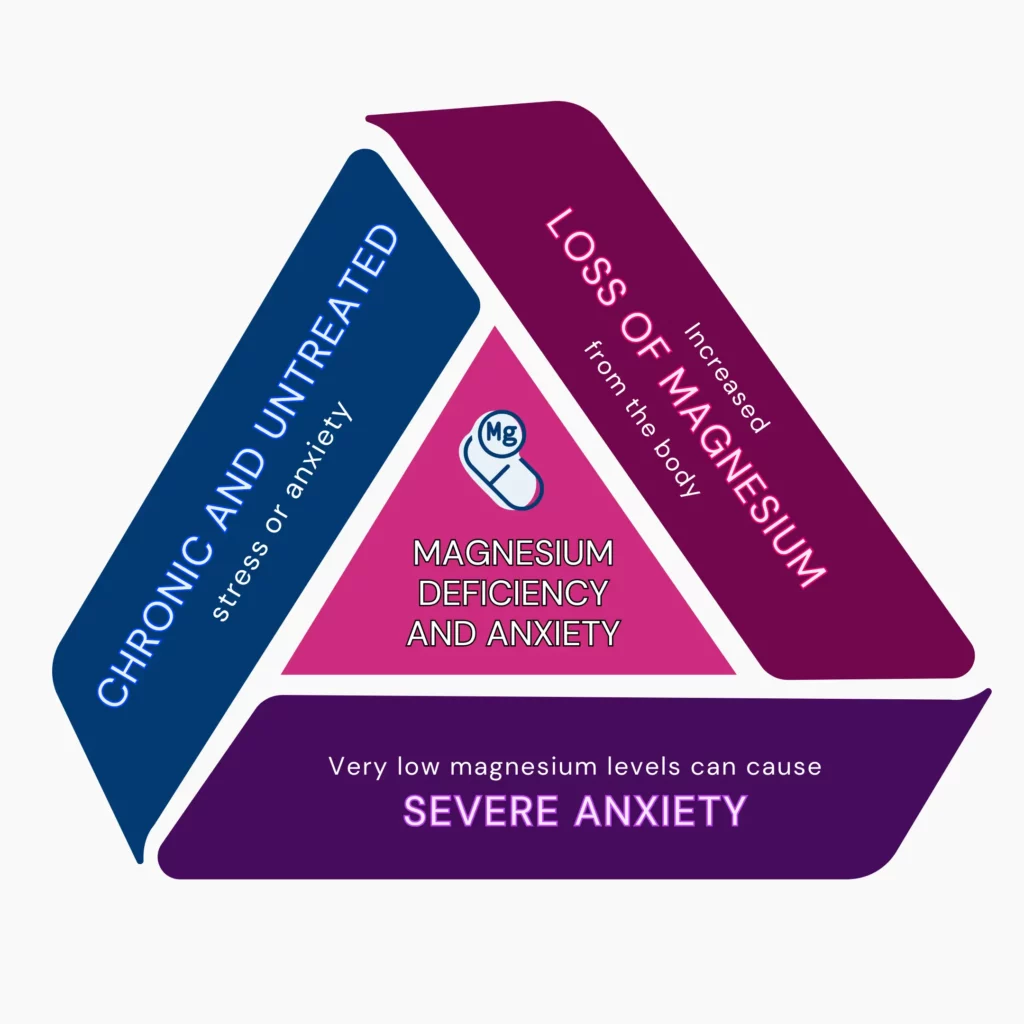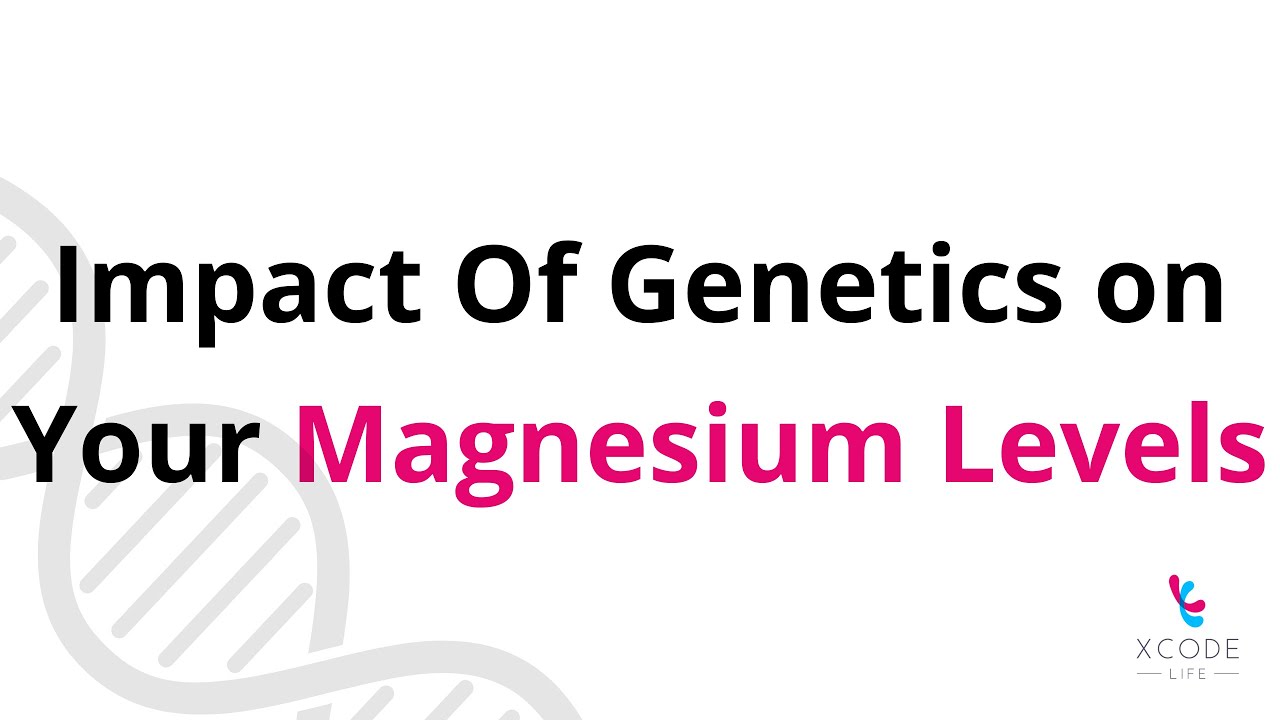In our search for comfort during moments of anxiety and stress, it's common to turn to indulgent foods like ice cream, donuts, and cheesy pizzas. While these treats provide temporary solace, they fall short of addressing the root causes of our anxiety. Stepping beyond momentary fixes, we find that proper nutrition can play a pivotal role in supporting mental well-being. Among the various nutrients, magnesium has emerged as a topic of interest for its potential "anxiety-relieving" properties. But does magnesium actually help with anxiety? In this article, we delve into expert insights to explore the efficacy of magnesium in alleviating anxiety symptoms, examining whether this vital mineral could be a crucial component in our mental wellness toolkit.
Magnesium And Mental Health
Anxiety is a feeling of intense fear or nervousness.
Around 4% of the global population currently experience some form of anxiety.
Anxiety is often treated with medications and psychotherapy.
Medications for anxiety include antidepressants and beta-blockers, while cognitive behavioral therapy is an evidence-based approach to relieve symptoms of anxiety.
Magnesium is a common mineral found in the body, yet many adults are deficient in it.
It plays a role in regulating energy levels and brain health, which means a deficiency in this mineral can affect your mental health.
Magnesium boosts brain function and regulates cortisol levels in the body.
Cortisol is associated with increased stress, and lowering it can help decrease symptoms of anxiety.
How Does Magnesium Help With Anxiety?
Magnesium plays a vital role in maintaining your overall health and well-being.
However, whether magnesium helps improve symptoms of anxiety is a subject of debate.
The good news is that some studies show that magnesium does help in improving some symptoms of stress and anxiety.
- Magnesium helps in relaxing muscle tissue. One of the major symptoms of stress and anxiety is muscle tension. A deficiency of magnesium can result in increased muscle tension and cramps.
- Magnesium helps you sleep better by regulating the levels of the neurotransmitter GABA in the body. The muscle-relaxing action of magnesium also contributes to improving sleep quality.
- Magnesium can help manage the body's cortisol levels. Cortisol is often called "the stress hormone." Stress and anxiety can increase the levels of cortisol in the body.
- Magnesium can regulate the chemical messengers or neurotransmitters in the brain. It, in turn, can help lower stress and anxiety.
Is There A Link Between Magnesium Deficiency And Anxiety?
Magnesium deficiency can cause delirium, mental numbness, and, in severe cases, coma.
It can also increase your risk of suffering from stress, depression, and anxiety.
However, we need more evidence and research to support this claim,
Health conditions such as diabetes and celiac disease are associated with low levels of magnesium.
People with alcohol use disorder can also suffer from magnesium deficiency.

What Form Of Magnesium Is The Best To Help With Anxiety?
You can either take magnesium as part of your diet or in the form of supplements.
Magnesium prescribed for anxiety should have two qualities:
- Access to the brain: It should be able to cross the blood-brain barrier to be effective against anxiety.
- Bioloavalibility: Indicating how much magnesium can be absorbed by the gut.
The two most commonly prescribed forms of magnesium are magnesium oxide and magnesium citrate.
But these two forms will likely pass through the gut and cause loose stools and diarrhea.
Based on some recent studies, here are the forms of magnesium commonly prescribed to relieve anxiety:
Magnesium Taurate
It is said to be one of the most effective forms of magnesium against anxiety.
This form of magnesium has an amino acid called taurine, which has a calming effect on the brain.
It also leads to better absorption of magnesium in the brain.
Magnesium taurate is gentle on the gut and does not cause loose stools or diarrhea.
Magnesium Threonate
Studies show that this form of magnesium effectively treats anxiety.
However, it is expensive and might require higher doses to be effective.
Magnesium Glycinate
Glycine is an essential amino acid and is an important neurotransmitter in the brain.
Glycine can significantly improve sleep, making this form of magnesium ideal for insomnia patients.
Magnesium glycinate is also quite gentle on the GI tract.
Magnesium Malate
This is one of the best-absorbed forms of magnesium.
It increases both the serum and muscle levels of magnesium.
Some studies show that magnesium malate can help treat chronic fatigue and fibromyalgia.
Current research shows that magnesium taurate and glycinate are most effective in treating anxiety and mental health disorders.
How Effective Is Magnesium For Anxiety?
There is limited research to show that magnesium is beneficial in treating anxiety.
However, magnesium does play a role in regulating the chemical messengers in the brain, which has led scientists to conclude that it might be effective in treating anxiety.
People who have used magnesium for their anxiety have generally given positive feedback.
If you are considering taking magnesium for your anxiety, start at low doses and gradually increase to avoid side effects.
You May Be Interested In: Is Anxiety Genetic? Nature Vs Nurture.
Magnesium For Anxiety: Expert Discussion
A viral TikTok video that has garnered widespread attention claimed that magnesium helps reduce anxiety.
Experts agree that we don’t have enough evidence to support this claim.
However, magnesium can potentially help alleviate the symptoms of anxiety.
Doctors say that magnesium can reduce anxiety since it plays a vital role in the body’s metabolic functions.
One hypothesis about anxiety disorders is that when you are anxious, the circuits in your brain are hyperexcitable.
This causes inappropriate signaling and, therefore, anxiety.
Magnesium may have a calming effect on the nervous system (hence, it may promote better sleep.)
This could be a possible reason why magnesium helps reduce symptoms of anxiety.
Clinicians will often ask you to get a thorough physical check-up before prescribing medication for anxiety.
It is done to rule out any nutritional deficiency that you might be facing, which could be causing the anxiety.
However, even if you are not deficient, you might still benefit from supplements to support your health.
It is always advisable to talk to your doctor before starting any supplements.
Did You Know?
Magnesium deficiency or hypomagnesemia can lead to muscle weakness, cramping, numbness, irregular heartbeat, loss of appetite, and several other symptoms. In certain cases, people may also have very high levels of magnesium, and this is termed hypermagnesemia. The magnesium levels in your body are partly influenced by your genes. CASR is a gene that contains instructions for producing a protein called the calcium-sensing receptor. Certain types of this gene can increase your risk of magnesium deficiency by reducing the reabsorption of magnesium in the kidneys. Learn more.
Side Effects Of Magnesium Supplements
Magnesium is generally safe for most people when taken appropriately.
The body does not store magnesium; excess magnesium is eliminated through stool.
However, more than 350mg of daily magnesium supplements can cause side effects.
They include:
- Stomach upsets
- Diarrhea
- Nausea
- Vomiting
Large doses of magnesium (more than 2500mg) can cause serious side effects such as irregular heartbeat, low blood pressure, confusion, and coma.
Magnesium Overdose Symptoms
If you have taken too much magnesium, you can experience the following symptoms:
- Nausea
- Stomach cramps
- Lethargy
- Facial flushing
- Muscle weakness
- Low blood pressure
- An irregular heartbeat
- Breathing difficulties
In severe cases, magnesium overdose can cause cardiac arrest.
Are There Other Benefits of Taking Magnesium?
Magnesium is a mineral that is essential for healthy bones, muscles, and nerves.
It acts as a cofactor (or helper molecule) in several important biochemical reactions in the body.
- Magnesium may help support healthy blood sugar levels. Studies suggest magnesium can help enhance insulin sensitivity, crucial in regulating blood sugar levels. People who consume more magnesium have a lower risk of developing type 2 diabetes.
- Magnesium promotes heart health: A 2021 study suggests magnesium helps keep blood pressure levels in check, a precursor for developing heart disease. It can significantly lower the risk of stroke and heart disease.
- Magnesium has anti-inflammatory properties: Inflammation is crucial in chronic illness and aging. Some research ties magnesium deficiency to oxidative stress related to inflammation. Taking magnesium supplements can help combat inflammation in the body.
Hand-picked Content For You: 7 Most Significant Magnesium Benefits For Men
Other FAQs About Taking Magnesium For Anxiety
When’s The Best Time To Take Magnesium?
It is best to take magnesium supplements with meals.
Taking magnesium on an empty stomach can cause diarrhea.
While some recommend taking magnesium supplements just before bed, you can take it any time during the day as long as you consistently take it.
How Much Magnesium Should I Take To Calm Anxiety?
At present, we don't have enough research to determine how much magnesium we need to treat anxiety.
The daily dietary allowance of magnesium recommended by the FDA is 350mg.
But this dose does not take into account any pre-existing mental health conditions.
If you are considering taking magnesium supplements, make sure that you consult your doctor to figure out the correct dose.
How Quickly Does Magnesium Calm You Down?
How long magnesium takes to work depends on your deficiency's severity and metabolism.
It usually takes up to a week for anxiety to subside after starting on magnesium supplements.
It is essential to be consistent and monitor your progress over time.
Best Food Sources Of Magnesium
- Avocados are a tasty and nutritious source of magnesium. Besides being an excellent potassium, Vitamin K, and fiber source, a medium-sized avocado provides around 58 mg of magnesium.
- Nuts are rich in magnesium. Cashews, almonds, and Brazil nuts have the highest amounts of magnesium.
- Legumes like chickpeas, beans, and soybeans are rich in magnesium. One cup of cooked black beans contains around 120 mg of magnesium. Legumes are also high in other nutrients, such as iron and potassium.
- Tofu is made from soybean milk and is a vegetarian and vegan diet staple. A 100g serving of tofu contains 35mg of magnesium.
- Seeds, including flax, chia, and pumpkin seeds, are high in magnesium. Pumpkins are an excellent source, including around 168mg of magnesium per 28g serving.
Precaution And Disclaimer
Magnesium is often prescribed to soften stool and treat constipation.
Too much magnesium can cause diarrhea and cramps.
Magnesium supplements can interfere with certain medications, including heart medicines, diuretics, and antibiotics.
It can react with the Prakinson's drug, Cinnamon.
If you take these medications, talk to your doctor before starting magnesium supplements.
People with heart disease, kidney disease, intestinal disease, and diabetes should not take magnesium supplements without consulting their doctor.
Summary: Does Magnesium Help With Anxiety
Magnesium is an essential mineral that plays a vital role in muscle function.
Some research shows that taking magnesium supplements can help manage anxiety.
While more credible research is needed, those taking magnesium for anxiety reportedly had positive experiences.
Many forms of magnesium are recommended to treat anxiety, such as magnesium glycinate and carbonate.
Epsom salt baths are an alternative way of magnesium absorption.
Foods rich in magnesium, such as legumes and seeds, can also help counter magnesium deficiency in the body.
Magnesium interferes with certain medications and can have some side effects when taken in excess.
It is always advisable to consult a doctor before starting any supplements.
References
https://www.ncbi.nlm.nih.gov/pmc/articles/PMC5452159/
https://www.ncbi.nlm.nih.gov/pmc/articles/PMC6470576/
https://www.ncbi.nlm.nih.gov/pmc/articles/PMC7827637/
https://www.who.int/news-room/fact-sheets/detail/anxiety-disorders






